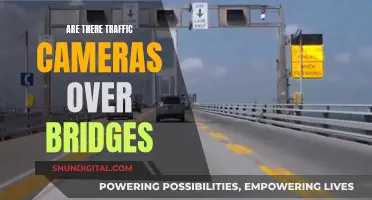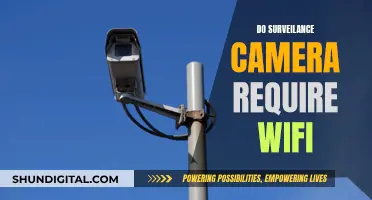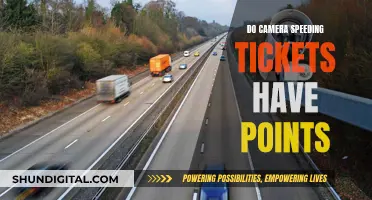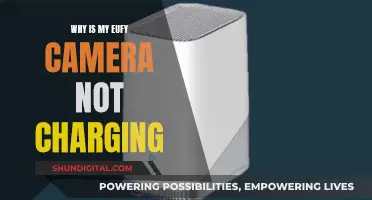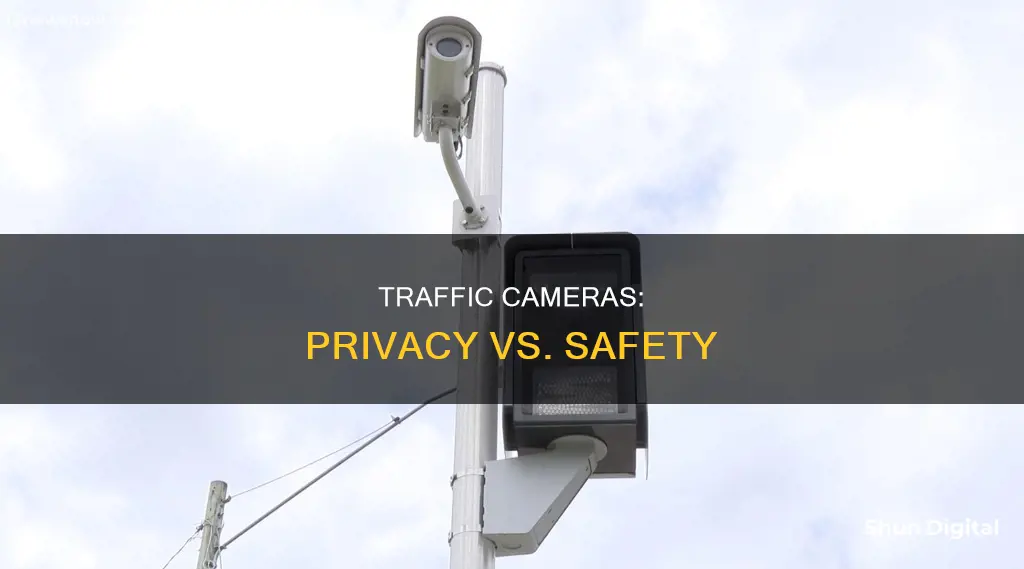
Traffic cameras are an increasingly common feature of roads in many countries, but their use is controversial. Some people argue that they improve road safety, while others claim that they violate constitutional rights, such as the Sixth Amendment right to confront witnesses and the Fourteenth Amendment right to due process. There are also concerns about privacy and the potential for governments to use these cameras for mass surveillance. This debate weighs up the pros and cons of traffic cameras and explores the complex legal and ethical issues surrounding their use.
| Characteristics | Values |
|---|---|
| Pros | Cons |
| Reduces accidents and injuries | Violates constitutional rights and due process |
| Discourages speeding and running red lights | Intrusion into daily life |
| Reduces traffic fatalities | Unclear if they improve general road safety |
| Assists law enforcement | Revenue-raising |
| Uncertain if they decrease crash rates |
What You'll Learn

The Sixth Amendment grants defendants the right to be confronted with witnesses against them
The Sixth Amendment to the United States Constitution guarantees criminal defendants several rights, including the right to confront witnesses against them. This amendment was ratified in 1791 as part of the Bill of Rights and has been applied to the states through the Fourteenth Amendment's Due Process Clause.
The Sixth Amendment's Confrontation Clause grants criminal defendants the right to confront and cross-examine witnesses against them. This clause is essential in ensuring a fair trial and allowing the accused to challenge the credibility and validity of witness statements. It is worth noting that the right to confront witnesses may not always be absolute and can be balanced against other interests, such as witness protection or public safety.
Traffic enforcement cameras are used to detect various motoring offenses, including speeding, running red lights, and unauthorized use of bus lanes. These cameras have been implemented in many states and have been the subject of debate regarding their effectiveness and potential violation of constitutional rights.
One argument against traffic cameras is that they may infringe on the Sixth Amendment rights of defendants. Since the camera is not a person, there is no opportunity for cross-examination, which is a key component of the Confrontation Clause. The ticket issued is typically a civil fine sent to the vehicle owner, raising questions about the certainty of the offender's identity. This process also denies the accused their day in court and goes against the principle of innocent until proven guilty.
Proponents of traffic cameras argue that they improve road safety and reduce accidents. Studies have shown that speed cameras, for example, can lead to a significant reduction in fatal and serious injury crashes. Additionally, the use of cameras can free up police resources and provide a more efficient means of enforcing traffic laws.
In conclusion, while traffic cameras may raise concerns about violating the Sixth Amendment rights of defendants, there are also valid public safety and efficiency considerations to take into account. The debate surrounding traffic cameras highlights the complex balance between ensuring public safety, respecting constitutional rights, and adapting to technological advancements in law enforcement.
Camera Cars: Capturing Unique Shots and Angles
You may want to see also

Cameras can reduce accidents and save lives
Traffic cameras are controversial, with some arguing that they violate constitutional rights, and others highlighting their ability to reduce accidents and save lives. This article will focus on the latter, exploring how cameras can be a force for good on our roads.
Reducing Speeding
Speed cameras are one of the most common types of traffic cameras, and they have been proven to reduce speeding. A key example is the UK, where speed cameras led to a significant reduction in personal injury collisions—a 22% decrease—and up to a 42% reduction in fatalities or serious injuries at camera sites. A similar result was seen in Barcelona, where speed cameras reduced road collisions by 27%, and injuries by the same amount. This is supported by a Cochrane Review, which found that all 28 studies accepted showed a reduction in crashes, injury crashes, and fatal or severe injury crashes.
Reducing Red-Light Running
Red-light cameras are another common tool, and they have been shown to reduce the number of vehicles running red lights. In one study, red-light cameras achieved a 67% reduction. This directly reduces the number of T-bone accidents, which are often severe or fatal.
Wider Safety Benefits
The benefits of traffic cameras extend beyond their immediate purpose. For instance, in Barcelona, the introduction of speed cameras not only reduced collisions and injuries on the beltway where they were installed but also on arterial roads, where there were no cameras. This suggests a wider cultural shift towards safer driving when drivers know that traffic cameras are in operation in an area.
Saving Lives
The ultimate goal of traffic cameras is to save lives, and the evidence suggests that they do. A 2017 LSE study found that adding 1,000 cameras to British roads could save up to 190 lives a year, while preventing 1,130 collisions and 330 serious injuries. This is a significant impact, and it's no surprise that groups like the National Highway Traffic Safety Administration have encouraged the use of automated speed enforcement.
In conclusion, while the debate around traffic cameras and constitutional rights is complex, there is strong evidence to suggest that these cameras can play a vital role in reducing accidents and making our roads safer for everyone.
Transferring Photos from Coolpix to Computer: A Step-by-Step Guide
You may want to see also

Cameras can be a source of revenue for governments
Traffic cameras are a controversial topic, with some arguing that they violate constitutional rights and due process. However, others argue that they are a necessary tool for law enforcement to improve road safety. One of the main arguments in favour of traffic cameras is that they can be a source of revenue for governments. While this may be true, it is important to weigh the pros and cons of relying on this technology for financial gain.
Traffic enforcement cameras are a significant source of income for local governments. These cameras are typically installed and operated by for-profit companies, some of which are foreign-owned. The companies contract with local governments to pay the capital cost of installing the cameras in exchange for a share of the revenue generated from fines. This provides a new revenue stream for governments without any associated operating costs, while also ensuring a tidy profit for the camera companies.
The financial benefits of traffic cameras can be substantial. For example, a single red-light camera in Nassau County, New York, generated a $65 fine and surcharge for one plaintiff. Across an entire county or state, the cumulative value of these fines can be significant. In the UK, for instance, a speed camera on a dual carriageway in Poole, Dorset, generated £1.3 million in fines annually.
However, the financial incentives created by traffic cameras can also lead to conflicts of interest and corruption. There have been accusations that local governments and camera companies game the system to increase revenue. One common allegation is that the timing of yellow and red lights is manipulated to catch more drivers running red lights. Studies have shown that decreasing yellow light timing can lead to an increase in red-light violations, providing evidence for this claim.
Additionally, the effectiveness of traffic cameras in improving road safety is questionable. While some studies show a reduction in accidents due to increased camera enforcement, independent studies and those financed by opponents often show no gains or even worse results. For example, it has been found that motorists are more likely to brake suddenly at camera-enforced intersections, increasing the risk of rear-end collisions.
In conclusion, while traffic cameras can indeed be a source of revenue for governments, this financial incentive may come at the cost of citizens' trust in their government and the legal system. The potential for corruption and the questionable impact on road safety should be carefully considered when implementing such technology.
Connecting Nest Camera: Computer Setup Guide
You may want to see also

Cameras can be a violation of constitutional rights and due process
The use of traffic cameras has been a topic of debate for years, with some arguing that they violate constitutional rights and due process. One of the main arguments against traffic cameras is that they can be a form of government overreach and a violation of privacy. Traffic cameras, particularly those with automatic number-plate recognition technology, can be used to track the movement of vehicles and, by extension, the vehicle owner. This can be seen as a form of mass surveillance, which invades privacy and goes beyond the intended purpose of enforcing traffic laws.
In the United States, the Sixth Amendment grants criminal defendants the right to confront their accusers. With traffic cameras, there is no person accusing the driver of a violation, and the ticket is issued to the owner of the vehicle, not necessarily the person driving. This raises questions about the certainty of the offender's identity and the constitutionality of issuing a ticket without a direct witness.
Another concern is the potential for corruption and abuse of power by government officials and private companies operating the cameras. In some cases, there are financial incentives for these entities to issue as many tickets as possible, leading to accusations of using the cameras as a revenue-generating tool rather than a safety measure. This can result in situations where the timing of traffic lights is manipulated to catch more offenders, increasing revenue.
The due process argument against traffic cameras was presented in a United States Eastern District Court case. The plaintiff, who received a red light camera violation ticket, filed a suit claiming a violation of the Due Process and Equal Protection Clauses of the Fourteenth Amendment. The suit was dismissed, with the court finding that the plaintiff's claims did not rise to the level of substantive due process under the federal and state constitutions.
While the right to be free from a traffic ticket may not be specifically outlined in the US Constitution, the broader implications of traffic camera usage on privacy, due process, and equal protection are concerning to many. The debate continues as to whether the benefits of increased road safety outweigh the potential infringement on constitutional rights and due process.
Charging the Canon Powershot A620: A Quick Guide
You may want to see also

Cameras can cause mistrust in government
Traffic cameras can cause a sense of mistrust in government, especially when they are used as a revenue-generating tool rather than a safety measure. While the primary purpose of traffic enforcement cameras is to improve road safety and reduce accidents, their use has sparked concerns about government surveillance, privacy, and financial motivations.
Intrusion and Privacy Concerns
The widespread use of traffic cameras has led to concerns about government over-monitoring of public roads and a perceived intrusion into daily life. This sense of intrusion is heightened by the fact that traffic cameras are often installed and operated by for-profit companies, some of which are foreign-owned. The use of automated technology to monitor and enforce traffic laws can make individuals feel like they are constantly being watched and tracked, even when they have done nothing wrong. This sense of being under constant surveillance can contribute to a general atmosphere of mistrust in government and its motives.
Financial Incentives and Conflict of Interest
The financial incentives associated with traffic cameras can also contribute to mistrust in government. In many cases, local governments contract with private companies to install and operate the cameras in exchange for a share of the revenue generated from fines. This arrangement creates a conflict of interest, as it provides a financial incentive for both the government and the camera companies to maximise the number of citations issued. This can lead to a perception that the primary purpose of the cameras is to generate revenue rather than improve safety.
Impact on Public Perception
The public perception of traffic cameras is often negative, with many motorists regarding them as a nuisance or an intrusion. This negative perception is exacerbated by the sense that the cameras are primarily a money-making scheme rather than a safety measure. The use of traffic cameras has been put to a vote in several jurisdictions, and in the majority of these cases, voters have opposed their use. This opposition indicates a deep-seated mistrust in the government's motives for implementing these measures.
Constitutional Concerns
The use of traffic cameras also raises constitutional concerns, particularly regarding the Sixth Amendment right to confront witnesses. Since the camera is not a person and cannot testify in court, the violations captured are typically treated as civil infractions rather than criminal offenses. This means that the ticket is issued to the owner of the vehicle, regardless of who was driving, and there is often no recourse for the offender to challenge the fine in court. This lack of due process and the presumption of guilt can further contribute to a sense of mistrust and resentment towards the government.
In conclusion, while traffic cameras are intended to improve road safety, their use can have unintended consequences. The sense of intrusion, concerns about privacy, and the perception of financial motivations can all contribute to a general atmosphere of mistrust in government. To mitigate these concerns, it is essential for governments to prioritise transparency, ensure robust oversight, and focus on safety rather than revenue generation.
Unleashing Camera Raw's Power: From Basics to Advanced Techniques
You may want to see also
Frequently asked questions
Traffic cameras have been deemed to not violate human rights by the European Court of Human Rights. However, some argue that they violate the Sixth Amendment, which grants criminal defendants the right to be confronted with witnesses against them.
Traffic cameras have been shown to be effective at reducing accidents and injuries, with some studies reporting a reduction in fatal and serious injury crashes of up to 44%.
The use of traffic cameras is controversial due to concerns about privacy, government surveillance, and the potential for conflicts of interest when private contractors are involved in issuing tickets.
The legality of traffic cameras varies across different jurisdictions. Some US states have outlawed their use, while others have specific requirements for their implementation. There have been legal challenges to their use, but courts have generally upheld their constitutionality.



